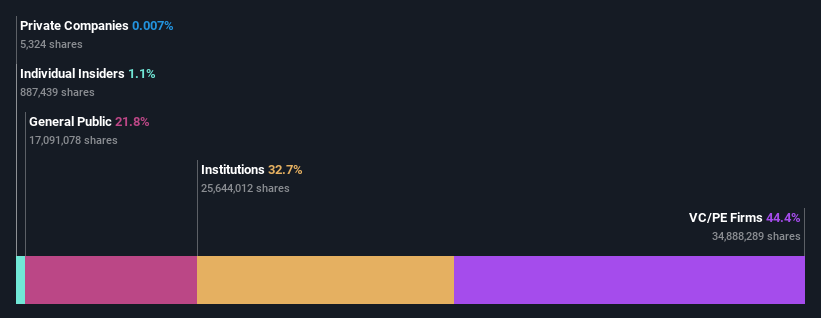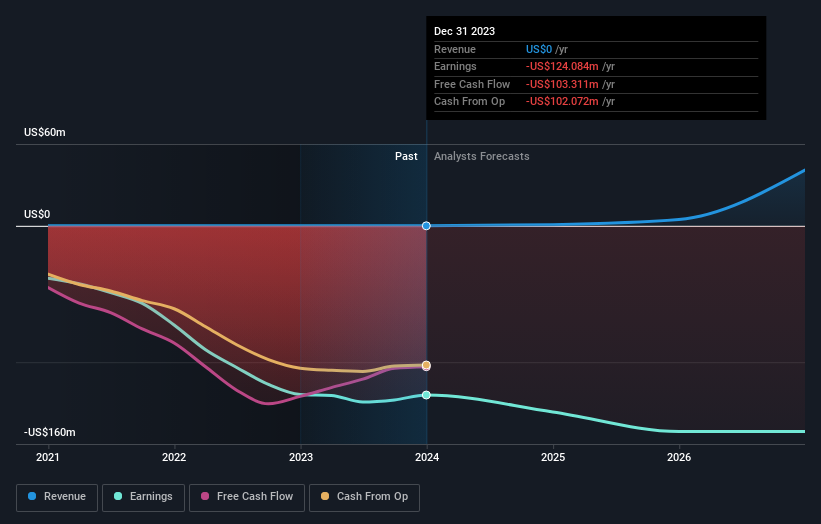- United States
- /
- Biotech
- /
- NasdaqGS:TNYA
Institutions along with private equity firms who hold considerable shares inTenaya Therapeutics, Inc. (NASDAQ:TNYA) come under pressure; lose 10% of holdings value

Key Insights
- The considerable ownership by private equity firms in Tenaya Therapeutics indicates that they collectively have a greater say in management and business strategy
- 50% of the business is held by the top 4 shareholders
- Insiders have been selling lately
If you want to know who really controls Tenaya Therapeutics, Inc. (NASDAQ:TNYA), then you'll have to look at the makeup of its share registry. The group holding the most number of shares in the company, around 44% to be precise, is private equity firms. That is, the group stands to benefit the most if the stock rises (or lose the most if there is a downturn).
Following a 10% decrease in the stock price last week, private equity firms suffered the most losses, but institutions who own 33% stock also took a hit.
In the chart below, we zoom in on the different ownership groups of Tenaya Therapeutics.
Check out our latest analysis for Tenaya Therapeutics

What Does The Institutional Ownership Tell Us About Tenaya Therapeutics?
Institutions typically measure themselves against a benchmark when reporting to their own investors, so they often become more enthusiastic about a stock once it's included in a major index. We would expect most companies to have some institutions on the register, especially if they are growing.
We can see that Tenaya Therapeutics does have institutional investors; and they hold a good portion of the company's stock. This can indicate that the company has a certain degree of credibility in the investment community. However, it is best to be wary of relying on the supposed validation that comes with institutional investors. They too, get it wrong sometimes. If multiple institutions change their view on a stock at the same time, you could see the share price drop fast. It's therefore worth looking at Tenaya Therapeutics' earnings history below. Of course, the future is what really matters.

We note that hedge funds don't have a meaningful investment in Tenaya Therapeutics. The company's largest shareholder is The Column Group, LLC, with ownership of 29%. Casdin Capital, LLC is the second largest shareholder owning 8.1% of common stock, and RA Capital Management, L.P. holds about 7.0% of the company stock.
To make our study more interesting, we found that the top 4 shareholders control more than half of the company which implies that this group has considerable sway over the company's decision-making.
While studying institutional ownership for a company can add value to your research, it is also a good practice to research analyst recommendations to get a deeper understand of a stock's expected performance. There are a reasonable number of analysts covering the stock, so it might be useful to find out their aggregate view on the future.
Insider Ownership Of Tenaya Therapeutics
The definition of company insiders can be subjective and does vary between jurisdictions. Our data reflects individual insiders, capturing board members at the very least. Management ultimately answers to the board. However, it is not uncommon for managers to be executive board members, especially if they are a founder or the CEO.
Most consider insider ownership a positive because it can indicate the board is well aligned with other shareholders. However, on some occasions too much power is concentrated within this group.
We can report that insiders do own shares in Tenaya Therapeutics, Inc.. As individuals, the insiders collectively own US$4.2m worth of the US$368m company. This shows at least some alignment. You can click here to see if those insiders have been buying or selling.
General Public Ownership
The general public-- including retail investors -- own 22% stake in the company, and hence can't easily be ignored. While this group can't necessarily call the shots, it can certainly have a real influence on how the company is run.
Private Equity Ownership
With a stake of 44%, private equity firms could influence the Tenaya Therapeutics board. Some might like this, because private equity are sometimes activists who hold management accountable. But other times, private equity is selling out, having taking the company public.
Next Steps:
I find it very interesting to look at who exactly owns a company. But to truly gain insight, we need to consider other information, too. Take risks for example - Tenaya Therapeutics has 5 warning signs (and 2 which are concerning) we think you should know about.
But ultimately it is the future, not the past, that will determine how well the owners of this business will do. Therefore we think it advisable to take a look at this free report showing whether analysts are predicting a brighter future.
NB: Figures in this article are calculated using data from the last twelve months, which refer to the 12-month period ending on the last date of the month the financial statement is dated. This may not be consistent with full year annual report figures.
Valuation is complex, but we're here to simplify it.
Discover if Tenaya Therapeutics might be undervalued or overvalued with our detailed analysis, featuring fair value estimates, potential risks, dividends, insider trades, and its financial condition.
Access Free AnalysisHave feedback on this article? Concerned about the content? Get in touch with us directly. Alternatively, email editorial-team (at) simplywallst.com.
This article by Simply Wall St is general in nature. We provide commentary based on historical data and analyst forecasts only using an unbiased methodology and our articles are not intended to be financial advice. It does not constitute a recommendation to buy or sell any stock, and does not take account of your objectives, or your financial situation. We aim to bring you long-term focused analysis driven by fundamental data. Note that our analysis may not factor in the latest price-sensitive company announcements or qualitative material. Simply Wall St has no position in any stocks mentioned.
About NasdaqGS:TNYA
Tenaya Therapeutics
A biotechnology company, discovers, develops, and delivers therapies for heart disease in the United States.
High growth potential with adequate balance sheet.


